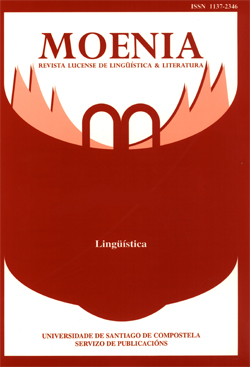Verbos denominales incoativos en español
Contenido principal del artículo
Resumen
Los verbos denominales incoativos constituyen una categoría verbal poco estudiada pero de un relevante interés lingüístico. Desde una perspectiva morfológica, estos verbos se forman a través de procesos como la sufijación y la parasíntesis por afijación. Desde un punto de vista semántico, los verbos denominales incoativos se caracterizan por denotar un cambio de estado físico o psíquico de una entidad experimentante. Esta expresión de incoatividad puede estar condicionada por el significado del sustantivo que sirve de origen para la formación de la unidad. Así, puede establecerse una clasificación dependiendo de si la base nominal indica estado propiamente dicho o si expresa estado a partir de procesos de extensión del significado (metáfora, metonimia, etc.). Además, es importante tener en cuenta tanto el significado de esa base nominal como la estructura argumental del verbo en lo referente a la configuración de la paráfrasis o estructura analítica que puede desarrollar la unidad verbal resultante. Por tanto, el sustantivo base juega un papel fundamental en la formación no solo morfológica, sino también semántica de los verbos denominales incoativos.


